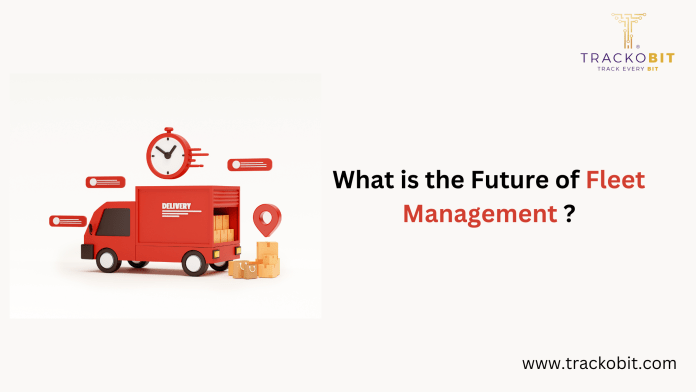We all know the fact how technology continues to evolve at a rapid pace, and the fleet management industry has undergone various transformations. This article explores what you can expect from the industry in the coming future.
So without wasting more time, let’s dive into this piece of writing.
Basics first!
What is Fleet Management?
Fleet management refers to the processes and systems used to manage a group of vehicles. The main aim of fleet management is to improve efficiency, safety, and productivity of fleet operations while minimizing costs and complying with legal regulations.
The various aspects of fleet management include-
- Vehicle Acquisition
- Maintenance and repairs
- Fuel Maintenance
- Driver Behaviour Monitoring
- Route Planning
With the help of these fleet management solutions, fleet managers can reduce operational inefficiencies, improve asset utilization, and enhance overall business performance.
What is the Future of Fleet Management
Technological advances, regulatory changes, and changing business needs shape the future of fleet management. Several trends and innovations will transform the industry in the coming years. Some of these are mentioned below-
1. Telematics and IoT Integration
Telematics systems and the Internet of Things (IoT) are for sure enhancing fleet management by providing real-time data insights. The system allows fleet managers to monitor vehicle health, driver behavior, fuel consumption, and location. This further enables better decision-making. IoT devices, such as connected sensors and GPS trackers enhance data collection, providing real-time information on vehicle inspection and performance.
This not only supports predictive maintenance i.e. having alerts on any kind of escalation that might take place in the future but also supports reduced downtime and operating costs. With the advancement of telematics, fleet managers can expect more detailed views, contributing to overall maintenance and better fleet productivity.
2. Autonomous Vehicles
The rise of autonomous vehicles, especially automated vehicles, will have a significant impact on fleet management. These vehicles can reduce reliance on human drivers, especially for long-distance trips, and improve efficiency.
One major innovation is “platooning,” where trucks driving self-driving trailers move closer together, reducing drag and reducing fuel consumption. By optimizing routes and reducing human error, fleets can reduce costs and increase safety. While fully autonomous shipping is still in its infancy, developments in this area could reshape the industry in the coming decades.
Fun Fact:-
Truck platooning is the linking of two or more trucks in a convoy, using connectivity technology and automated driving support systems.
3. Electrification of Fleets
Reducing carbon is one of the challenges in today’s world. This is the reason why we can see a hike or increase in the electrification of vehicles. Many maintenance vehicles are turning to electric vehicles (EVs) to comply with stringent environmental regulations and benefit from long-term cost savings in fuel and maintenance. EVs have fewer mechanical parts than incinerator vehicles, reducing cleanliness.
But as fleets adopt more EVs, the need for more flexible charging infrastructure and advanced systems to manage charging schedules and provide more efficient vehicle use will increase Over time, electricity will become a key component of green and sustainable shipbuilding.
4. Artificial Intelligence (AI) and Machine Learning
AI and machine learning are transforming fleet management by enabling predictive analytics, real-time decision-making, and automation. Powered by AI, predictive analytics can predict when vehicles need repairs, reducing unexpected breakdowns. AI also helps optimize routes based on traffic data, weather, and other variables.
As AI systems improve, tasks such as scheduling, logistics, and managing fleet operations can be automated. This reduces the need for manual intervention and improves overall efficiency. The integration of AI into fleet management is expected to streamline operations and enable more intelligent decision-making.
5. Big Data and Advanced Analytics
The future of fleet management lies in harnessing the power of big data. Fleets provide a wealth of data, from vehicle inspections to driver performance. Advanced analytics tools can process this data, yielding insights that can be used to improve decision-making. For example, fleet managers can use the data to provide better fuel economy, analyze driving habits, and design more efficient routes.
Additionally, big data enables lifecycle management, helping companies decide when to buy, repair, or dispose of vehicles. By harnessing data, fleet managers can reduce costs, improve efficiency, and make better long-term decisions.
6. Sustainability and Regulatory Pressures
As environmental regulations tighten, the pressure on fleet managers to implement sustainable practices increases. Governments and consumers are pushing for green fleets powered by renewable fuel, hybrid, or electric vehicles. Compliance with these regulations often requires fleet modifications, such as investment in low-carbon vehicles, and compliance with stringent emissions standards, in addition to environmental regulations, fleet managers must ensure compliance with safety regulations, driver hours, and vehicle inspections.
Navigating these regulatory pressures will require a combination of sustainable technologies, compliance monitoring tools, and ongoing education.
Final Words
To conclude, fleet management promises to bloom much better in the coming future as it will become more data-driven, autonomous, and sustainable as new technologies emerge. Fleets will need to adapt to these innovations to remain competitive, efficient, and compliant with regulations.
Now that you know what the future of the fleet looks like, you might be planning to invest in fleet management software, TrackoBit can be your partner in this. With this GPS fleet tracking software trace your vehicle’s real-time locations, cut down on fuel costs, and predict breakdowns without delay.
